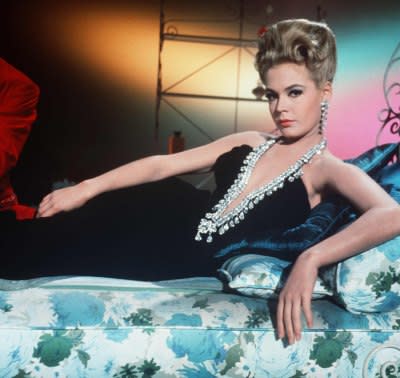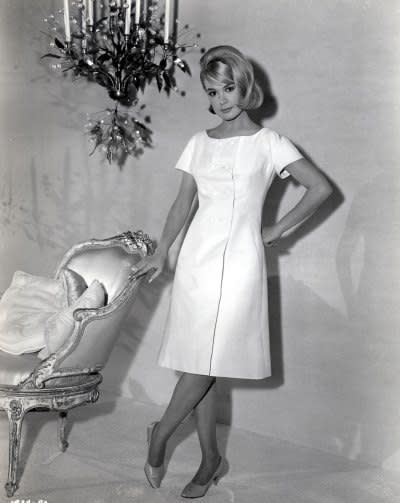Sandra Dee Was ‘So Grateful’ for Son Dodd for Helping Her Through Years of Heartbreak
Sandra Dee arrived at The Polo Lounge inside the Beverly Hills Hotel with a smile. “We sat at a table in the back, and she looked beautiful,” recalls former Hollywood Reporter columnist Sue Cameron to Closer. “Then, I ordered an iced tea, and she ordered a martini...and then another one.”
A dozen years earlier, a showbiz trade publication had proclaimed Sandra the “No. 1 Star of Tomorrow” thanks to her portrayals of spirited, engaging, wholesome young women in the movies. In 1959, she starred in two of the year’s biggest hits, the surfer-girl comedy Gidget, and the romantic drama A Summer Place. But the sunny persona of Sandra Dee was purely a fabrication. The secret pain the actress carried would taint the triumphs of her life and drive her to an early death at age 62. “She really wanted to die,” says Cameron.

By the time Sandra met the writer in the 1970s, she’d already been married and divorced from singer Bobby Darin, the father of her son, Dodd, and dropped by Universal, the studio that signed her as a teenager. “Sometimes I feel like a has-been that never was,” Sandra said in 1967.
It would be another two decades before Sandra revealed her full life story. “My real father was a drunk,” Sandra, who was born Alexandra Zuck in Bayonne, New Jersey, confided in 1991. After he disappeared, Sandra was raised by her overprotective mother, Mary, who dressed her like a doll and spoon fed her until the age of 6, yet turned a blind eye when Eugene Douvan, the well-off, much older man she wed in 1950, began sexually abusing Sandra.
“By the time I was 11, I knew it wasn’t right. But what could I do, tell my mother? I figured she knew,” said Sandra, who was forced to sleep between her mother and stepfather in bed.
Like so many victims of sexual abuse, she developed an eating disorder as a way to exert control over her own body. “My mother tried to get me to eat. We had screaming, tortured fights,” she recalled.
Days after her stepfather died while undergoing heart surgery in 1956, Sandra auditioned for the producer who would bring her to Hollywood. “Sandra loved acting,” says Cameron. “When she was in front of the camera was the only time she felt free.”
Sandra remembered her days as Hollywood’s brightest young star as fun, “but it was my mother who really loved all the acclaim,” she said. “She was in her glory.” The actress continued to struggle privately with anorexia — in her heyday, she stood 5-foot-5 and weighed 90 pounds. It got so bad that Sandra had to be hospitalized several times.
Ironically, Sandra’s mother forced her to accept her first date with Bobby Darin, her costar in 1961’s Come September. “She didn’t figure on my having a good time without her,” said Sandra, who initially found the Bronx, New York-born singer too cocky. Within months, the young performers were engaged.
A livid Mary boycotted the couple’s December 1960 wedding, but she soon wormed her way back into Sandra’s head. “Sandra married Bobby in defiance of her mother and her mother did everything to kill it,” says Cameron. There were also other issues, including Bobby’s jealousy and late nights and Sandra’s drinking, that contributed to their 1967 divorce — but they never fell out of love. “They both always wanted to get back together,” said Cameron. “They were looking at a house in Bel Air to buy after they got married again.”
Sadly, it wasn’t meant to be. Bobby, whose heart had been damaged by a childhood case of rheumatic fever, underwent a double valve replacement in 1972. Months later, he neglected to take antibiotics before a dental procedure, which resulted in blood poisoning. “It was deliberate,” insists Cameron. “He could tell his heart was failing and he didn’t want to live like that anymore.” Bobby died after undergoing his second open heart surgery at age 37, leaving Sandra emotionally devastated. “My mom never recovered from my dad’s passing,” their son Dodd said. “A lot of her died the day he died.”
Cameron remained friendly with Sandra and visited her Beverly Hills home. At one point, she was working as a television executive and offered Sandra the chance to star in a soap opera. “Many actors think that is a comedown, but I knew she needed the money,” says Cameron. “I could see that she wanted to do it, but her mother killed the deal.”

Despite all that had gone on between them, Mary remained a force in her daughter’s life for many years. “She was the mother from hell,” says Cameron, who was never allowed to visit with Sandra in private. “Her mother would either sit there and listen to the conversation or stand just outside the door.”
But before Mary’s death in 1988, Sandra confronted her about the abuse she suffered at the hands of her stepfather and her mother’s failure to stop or even acknowledge it. “She ignored me,” Sandra recalled. “My mother erased the abuse from her own mind. It didn’t exist, so she didn’t have to feel guilty.”
Sandra died of kidney failure in 2005 brought on by years of substance abuse and starvation diets. “You have to be very strong to survive all she suffered, and she couldn’t,” says Cameron, who adds that the sole source of light in Sandra’s later years was her son, Dodd, who never faltered in his love. “She was so grateful to Dodd. She really loved him,” says Cameron. “She felt the love from him and that brought her joy.”